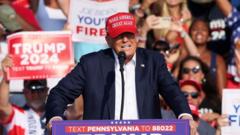The escalating tension between Brazil and the US arises from Trump's support for Bolsonaro, leading to potential trade consequences.
**Brazil Prepares for Trade War with US as Trump Threatens Tariffs**

**Brazil Prepares for Trade War with US as Trump Threatens Tariffs**
Brazilian President Lula da Silva vows to implement reciprocal tariffs on US goods following Trump's import tax threat.
Brazilian President Luiz Inácio Lula da Silva has made a decisive statement regarding the escalating trade tensions with the United States. In response to a recent threat from US President Donald Trump to impose a staggering 50% import tax on Brazilian products starting August 1, Lula affirmed that Brazil is prepared to retaliate with equivalent tariffs on American goods. The conflict originated from Trump's concerns over Brazil's legal actions against former President Jair Bolsonaro, who is currently facing allegations of attempting to stage a coup following his loss to Lula in the 2022 election.
In a letter, Trump expressed support for Bolsonaro, labeling him "a highly respected leader" and criticizing Brazil's legal proceedings against him as a “witch hunt.” He urged Lula to stop what he perceives as an unjust trial. Trump's remarks come amidst a broader context where he has previously criticized Brazil's treatment of Bolsonaro, drawing parallels to his own legal challenges in the United States.
Lula responded robustly via the social media platform X, underscoring Brazil's sovereignty and independence. He emphasized that Brazil would not tolerate unilateral tariff hikes from the United States and would impose reciprocal measures in response. Notably, the US is Brazil's second-largest trading partner after China; thus, a potential jump from a 10% to a 50% tariff could significantly impact Brazil's economy.
Challenging Trump's claim of a trade deficit, Lula cited US government statistics indicating that the United States actually experienced a trade surplus of $7.4 billion with Brazil in 2024. This statistic reinforces Brazil's position in the trade relationship, with Brazil exporting goods such as gas, petroleum, iron, and coffee to the US, while importing mineral fuels, aircraft, and machinery in return.
While Brazil is not alone in facing potential tariff increases from Trump—who has targeted several other nations including Japan and South Korea—his letter to Lula uniquely involved political implications regarding Bolsonaro's trial and alleged censorship by Brazil over social media platforms. Lula defended the ruling, arguing it aligns with the values of a democratic society that rejects harmful content and human rights violations.
Political analysts suggest that Trump's confrontational stance may inadvertently bolster Lula's domestic standing, as historical precedents show that leaders often gain popularity when facing external pressures from conservatives like Trump. However, the future effectiveness of Lula's response hinges on the government’s ability to present a united front against these challenges.
As the countdown to August 1 approaches, all eyes are on Brazil and the potential for significant shifts in international trade relations stemming from this contentious issue.
In a letter, Trump expressed support for Bolsonaro, labeling him "a highly respected leader" and criticizing Brazil's legal proceedings against him as a “witch hunt.” He urged Lula to stop what he perceives as an unjust trial. Trump's remarks come amidst a broader context where he has previously criticized Brazil's treatment of Bolsonaro, drawing parallels to his own legal challenges in the United States.
Lula responded robustly via the social media platform X, underscoring Brazil's sovereignty and independence. He emphasized that Brazil would not tolerate unilateral tariff hikes from the United States and would impose reciprocal measures in response. Notably, the US is Brazil's second-largest trading partner after China; thus, a potential jump from a 10% to a 50% tariff could significantly impact Brazil's economy.
Challenging Trump's claim of a trade deficit, Lula cited US government statistics indicating that the United States actually experienced a trade surplus of $7.4 billion with Brazil in 2024. This statistic reinforces Brazil's position in the trade relationship, with Brazil exporting goods such as gas, petroleum, iron, and coffee to the US, while importing mineral fuels, aircraft, and machinery in return.
While Brazil is not alone in facing potential tariff increases from Trump—who has targeted several other nations including Japan and South Korea—his letter to Lula uniquely involved political implications regarding Bolsonaro's trial and alleged censorship by Brazil over social media platforms. Lula defended the ruling, arguing it aligns with the values of a democratic society that rejects harmful content and human rights violations.
Political analysts suggest that Trump's confrontational stance may inadvertently bolster Lula's domestic standing, as historical precedents show that leaders often gain popularity when facing external pressures from conservatives like Trump. However, the future effectiveness of Lula's response hinges on the government’s ability to present a united front against these challenges.
As the countdown to August 1 approaches, all eyes are on Brazil and the potential for significant shifts in international trade relations stemming from this contentious issue.




















